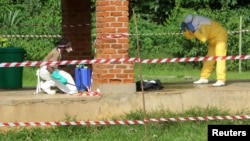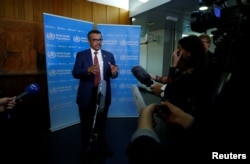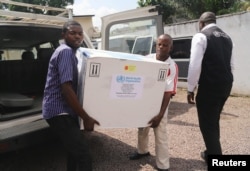The World Health Organization reports one confirmed case of the deadly Ebola virus in the city of Mbandaka, a city of more than one million 150 kilometers from Bikoro where the outbreak started.
WHO says as of May 15, 44 cases of Ebola have been reported in the DRC and more than 20 people have died. Except for the confirmed case in Mdbandaka, the other cases have been in Bikoro, a remote, northwestern area that is very hard to reach.
The Ebola virus is endemic in Congo, and despite Congo's experience with the disease, the difference between this one and previous outbreaks is the location.
Bikoro lies near two major rivers that could transport infected people to urban areas including Kinshasa and Brazzaville. Mbandaka is also on the Congo River about 4,000 kilometers north of Kinshasa, the capital of the DRC, whose population is roughly ten million.
Dr. Peter Salama, WHO deputy director-general for emergency preparedness and response, called this latest news "a game changer."
WHO's regional director for Africa said WHO and its partners, including Médecins Sans Frontières, or Doctors Without Borders, are working to rapidly scale up the search for all contacts of the confirmed case in Mbandaka as well as those in Bikoro. The WHO is holding an emergency meeting Friday to evaluate the situation.
The speed of the WHO's involvement and those of its partners is one of the major differences between this Ebola outbreak and the one that ravaged West Africa between 2014 and 2016.
And, despite the arrival of Ebola in an urban area, Dr. Tedros Adhanom Ghebreyesus, WHO Director-General said "we now have better tools than ever before to combat Ebola. WHO and our partners are taking decisive action to stop further spread of the virus."
Tedros led a delegation to the DRC May 13 that included Dr. Matshidiso Moeti, the WHO Regional Director for Africa, and Salama. They met with Congolese President Joseph Kabila and the country's minister of health to evaluate the response and determine the next steps in stopping the virus.
Stephen Morrison, Director of the Global Health Policy Center at the Center for Strategic and International Studies, conducted research on the West African outbreak that claimed more than 11,000 lives and is carefully watching the current outbreak in a rural area in the northeast of the DRC.
"I thought it was very commendable and a great sign of the change of outlook that Dr. Tedros was personally there on the ground, and that was very important," Morrison said. "It rallies the troops, it shows determination and commitment and speed."
One of the changes from the 2014 outbreak is that the WHO has an emergency fund to get experts and materials in place. The first batch of an experimental vaccine, which proved to be safe and effective at the end of the epidemic in West Africa, has already arrived in Congo. It will be administered to health care workers and those exposed to the virus in just days.
Merck, the pharmaceutical company that makes the vaccine, has promised to supply however much is needed for this outbreak. The vaccine is not licensed, and some argue that since it works, it is no longer experimental.
A multidisciplinary team has been in Bikoro, where the outbreak first occurred since May 10. The U.S. Centers for Disease Control and Prevention also has personnel in place. In addition, the World Food Program is providing an air bridge to get the vaccine and supplies to the affected region with several flights a day. Treatment centers that isolate the sick are operational, as are hand washing stations containing a solution of bleach and water to kill the virus.
Morrison said what is unfolding in Central Africa "shows a lot of learning and a different pattern of response."
In 2014, it took more than six months for the international community to address that outbreak. By then, it was already spreading in the three impoverished West African countries.
Another difference: Ebola was unknown in West Africa in 2014. This is the ninth Ebola outbreak in the DRC since 1974, when the country was named Zaire and the virus was named after the Ebola River near the source of the outbreak.
Morrison says the response to this outbreak shows no complacency.
"We are very concerned," added Salama. "And we are planning for all scenarios, including the worst case scenario." In the massive Ebola outbreak in Guinea, Liberia and Sierra Leone in West Africa, the virus entered the capital cities in all three countries.
In Congo, the government, WHO and others are working to make sure, if at all possible, this doesn't happen.






